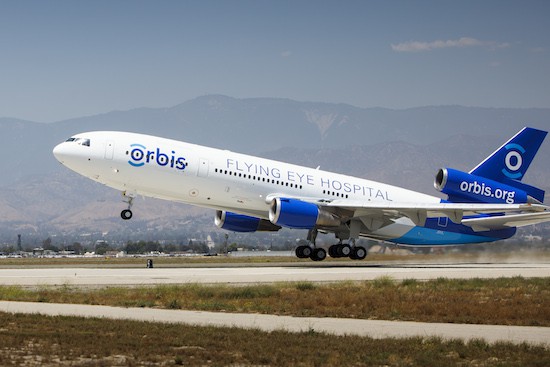A Goal Within Sight: How Blindness Prevention Can Empower Women and Boost Emerging Markets
I stood on the edge of a dusty soccer field in Bihar, India’s poorest and most populous state. In rural areas like this one, the prevalence of blindness is very high due to a severe shortage of trained workers and resources. The poverty rate is high. Girls face very limiting gender norms: economic exploitation, child marriage and attitudes that prevent so many of them from getting an education.
But here before me, running, kicking up dust and playing with all their hearts, was the answer.
This all-girls soccer team was formed by the man who founded Akhand Jyoti Eye Hospital (AJEH). He saw two urgent needs in Bihar: health care workers for an eye hospital, and education for girls. He decided to address both. But first he had to attack local attitudes about what women could and could not do.
He offered parents a free education for their girls if they would let them play soccer, something girls simply never did. Most parents resisted, but some said yes, and now there are 140 girls in an educational and vocational program that combines soccer and school. After they graduate, the girls are trained as optometrists and health care managers, providing the hospital with a pool of locally trained eye health professionals.
The hospital’s mission is to eradicate avoidable blindness, or blindness that can be prevented or cured by known, cost-effective means, in Bihar by empowering women. Already the hospital conducts 65,000 surgeries – 80 percent of them free – and treats 300,000 patients with glasses every year. It has a growing network of vision centers around Bihar.
All the vision centers have female staff members, and in fact, women make up 78 percent of the staff at the hospital and affiliated centers. These women make a much better living than they would have otherwise. They and their families are lifted out of poverty – as well as the patients who receive the glasses they need to work, the surgery that halts their glaucoma or the operation that reverses their blindness due to cataracts.
AJEH plans to open three new surgical centers and 27 new vision centers, staffed in large part by a female workforce, over the next five years. At least 20 of the vision centers will be all-women centers while the rest will have women making up at least half of the staff.

Orbis’s Flying Eye Hospital by Richard Jorgenson/Orbis
Both AJEH and Orbis empower local people to fight blindness. Orbis sends volunteer eye surgeons, nurses and technicians to low-resource countries to train local eye health workers on how to prevent and reverse avoidable blindness.
The need is great and urgent. There are 285 million people in the world who have low vision or are blind, and four in five of them suffer from conditions that are curable, treatable or preventable. You can learn more about this thanks to the International Agency for the Prevention of Blindness and the World Health Organization.
But 90 percent of the world’s visually impaired population live in low-income settings, and they lose their sight simply because they don’t have access to eye care. Women are even more at risk. They are 40 percent less likely to receive access to health care compared to men, and it shows: two-thirds of the world’s blind people are women, according to a Seva Foundation report.
Both women and men in low-resourced areas are going blind from diseases that people in the U.S. generally think of as simple to treat. Preventable diseases like cataracts, glaucoma and diabetic retinopathy often go undiagnosed and untreated in places like Bihar, where the adult cataract surgical rate is only half of the national average, indicating poor eye care services. Services may be hard to come by, either too far away or too expensive in a highly rural population living below the poverty line. Many people don’t even know that help is available. For children, this neglect is especially dangerous – the eye may never learn to see properly if not treated early, causing lifelong blindness that is otherwise preventable.
There is hope for reaching the girls and women who face these challenges, because preventing blindness is not only good for their health – it is good for the entire community. Every $1 invested in blindness elimination generates approximately $4 in economic gain in low-resource countries.
Children who have their blindness or vision impairment treated can go to school and prepare for a better future. Adults who have their blindness reversed can go back to work and support themselves and their families.
Our team at Orbis recognizes the obstacles in the way of access to eye care around the world, and we work with partners like AJEH to provide the skills, resources and knowledge needed to deliver accessible quality eye care. By implementing hands-on training, strengthening hospital infrastructures and advocating for the importance of eye health, Orbis trains local eye health professionals around the world to provide sustainable services for women, men, girls and boys – to restore their vision and access to opportunities.
AJEH offers an interesting, scalable model as well: the hospital is currently run by a nonprofit trust (the Yugrishi Shriram Sharma Acharya Charitable Trust) through which most of its training and treatment activities take place. It also, at present, has a for-profit private arm which supports the optical business including the sale of glasses at vision centers. At year-end, any surplus from the for-profit optical business goes directly back to the nonprofit to fund free cataract surgeries for community members. This merging of non- and for-profit models allows AJEH to be funded while considering additional creative potential business solutions for its work moving forward. AJEH plans to be completely sustainable by 2022.
At Orbis, we always partner with a local hospital to create customized training programs, either with a visit by Orbis’s Flying Eye Hospital, the world’s only ophthalmic teaching hospital aboard an MD-10 aircraft; through Cybersight, our online education and remote-medicine platform; or by working directly within the hospital as we’re doing in Bihar.
Orbis is partnering with AJEH to improve the quality of systems and eye care services and to make pediatric eye care services available and sustainable to 8.8 million children across six Bihar districts. Orbis staff works with AJEH to develop and train human resources, strengthen the hospital’s operations and expand its outreach by establishing processes for screenings through remote vision centers and a mobile vision van. All the work that Orbis does through meaningful partnerships such as with AJEH is designed to strengthen entire eye health systems by training the whole eye care team, from doctors to nurses to technicians and advocates, in order to create overall sustainable models for the countries in which we work. Specific to India, under the India Childhood Blindness Initiative, Orbis has successfully established 32 formal Children’s Eye Centers across the country, and we have plans to replicate this successful model at AJEH as well.
The women at AJEH and the future optometrists playing soccer are two examples of women helping women to fight blindness. But everyone can be a part of this team by raising money or awareness. Orbis has a strong donor base that supports our work, but with more investment, we can develop more programs like these and restore sight and opportunities to more people around the world.
Today there is an incredible opportunity for everyone from eye health care specialists and surgeons, to young social enterprise entrepreneurs, to large foundations and corporations, to rethink health care, and to do so especially through the lens of gender equity. By focusing on this now, the outlook could very soon change for the better for so many young girls and women – and their communities – around the world.
Kristie DeKoker is the director of donor development for Orbis International.
UPDATE: Soccer photo by Kristie DeKoker/Orbis
- Categories
- Health Care



